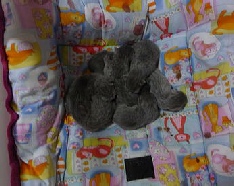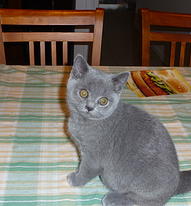Copyright © Carinya British Shorthairs 2016

Carinya British Shorthair
At Carinya, we have a small breeding program that focusses on health and temperament first and foremost and of course on type.
All Carinya British kittens are born and raised in our home and have lots of cuddles and attention. Babies are handled from birth to ensure an easy disposition.
Vaccinations: Kittens will be vacinated with F3 at 8 weeks and again at 12 weeks of age. They will also be wormed regularly.
At around 10 weeks of age, depending on size / weight, the kittens will go to our wonderful vets at the Wilsonton Veterinary Clinic to be desexed and microchipped.
Having bred cats for over 38 years, we have had lots of opportunity to investigate whether a totally indoor cat is as happy and well-
Personally, I feel the cats are just as happy and content if they have a loving and caring family who spends time with them. Cats are social beings and LOVE to be made a fuss of so keep your kittens / cats safe, save the wildlife and keep them indoors.
Diet
At Carinya, we believe in offering a diet that meets all of the needs of our adults, and later on, their kittens. All of our cats have access to quality dry food but also all have a raw meat diet, some fish, chicken, a little cheese and even the occasional prawns!
Kittens are also raised on a fresh meat, chicken & fish diet with access to dry food when they are old enough. There are several high quality biscuits that are available at Vets and good pet shops. We do not generally give milk once kittens have been weaned but access to plenty of fresh water is always available.
When you take your kitten home, please make sure you read the diet sheet carefully and continue to feed as per these instructions, at least for the first few weeks. If you feel the need to vary the diet, please do this VERY slowly so as not to upset the kitten's digestion.
Bathing a British
Bathing a British can be quite a challenge if not practiced young. Even though you may not feel the need to bathe him or her, it is wise to train the little one as it is quite a time-
The British coat can be quite difficult to wet thoroughly to the skin. Half fill a suitable sink with nice, warm water. I usually put a little of the shampoo I am intending to use in the water to help with the "wetting" process. Talking calmly to your kitten, place them in the water and quietly proceed to wet the coat thoroughly. Apply a good quality shampoo and massage in well. When you have shampooed the entire kitten, let out the water in the sink and begin to rinse with warm water from the tap, making sure you proceed carefully around the face area. When there are no more suds coming from the coat, it is time to dry your kitten.
Firstly wrap him or her in a towel and pat dry as much as possible. The new style microfibre cloths are really good for soaking up water from the coat. Now you will need to get the coat dry. You should not leave a kitten damp as they may get a chill. Therefore, have a hair dryer handy, one that has several speed and heat settings is best, and turn it on the lowest speed / heat and begin to direct this on the kitten. Having a brush handy [natural bristle is best or a slicker brush] is useful -
Proceed to dry the entire coat, brushing the hair on the back towards the head to help wityh the drying process and to assist the hair to stand out from the body. Make sure the kitten's chest area is thoroughly dry before letting the kitten go.
Unless you are having problems with fleas, you should not need to bathe your kitten more than once every 3 months or so. This is up to you. You will need to groom him or her though as even a British coat can matt if not properly cared for.
Training your kitten to be groomed is also very important. I like using a flea comb -


A New Born Litter


One of the above at about ten weeks of age